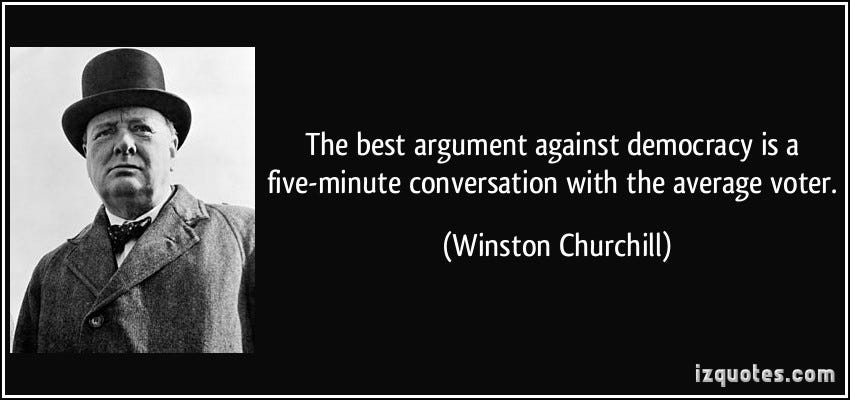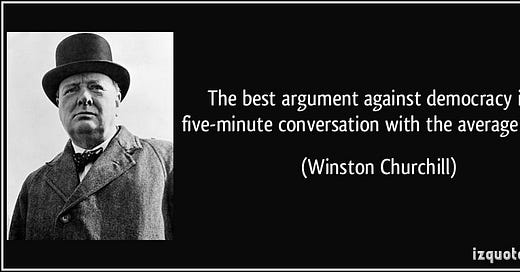Epistocracy vs Idiocracy

A friend sent me a link to an article by Zsolt Kapelner titled “Shouldn’t we entrust experts instead of low-information voters with political decision making?” The article is a loose review of Jason Brennan’s book “Against democracy,” also commenting on some articles discussing and debating the book. My friend wanted to know what I think about it.
Well, to start with, it made me sad. It would be easy to dismiss the article as low-information, but everybody mentioned in the article, Brennan and all of his critics are suffering from the same intellectual delusions, the assumption, that there is some sort of agreement on what we are talking about. It is not defined what democracy is; what an expert is or how the whole system is supposed to work. It is not very different from the primitive Marxists concept of the ‘people’s power’ that I addressed in an earlier post “Why Marxism.” Without answering the basic questions, standing on long discredited shaky foundations, the discussion of the subject is little more than condescending intellectual blabber.
It is exactly one hundred years ago that Mises published Economic Calculation in the Socialist Commonwealth. Hayek’s Fatal Conceit was printed in 1988, just a year before the fall of the biggest experiment they criticized in their books. These works make it absolutely clear what makes distributed decision making processes far superior to centralized ones, democratic or otherwise. Their work and their conclusions are still unchallenged.
….but sure, let’s have another go at it.
Democracy
The essence of politics is decision making. As I pointed out in ‘Why Marxism’, beyond a certain point, collective decision making is a practical impossibility. There is no ‘general will’, there is no collective decision making. There are too many possible decisions to make, all influenced by a multitude of external conditions. Democracies are systems of delegated decision-making and as such they are an aggregation of compromises. The questions of democracy are:
Who is making the decisions?
What is the process of delegation and representation?
How many layers does the delegation have?
What is the power distribution between those layers?
What is the scope of the possible questions that we delegate?
Most problems of democracy are rooted in the shifting definitions of its role in our lives, not the mechanisms of its working. The flaw of democracies is their tendency to amass more and more power at the expense of their electorate. Making people responsible for the consequences of their own choices make them both smarter and more responsible. Taking choices away from them makes them dumb. Brennan’s idea of improving democracy is to take choices away from people. After democracies made the electorate irrelevant, the proposed cure for the problems this caused is making the electorate even less relevant.
Expertise
I am also trying desperately to picture how this is envisioned to work. I must try, because I am not getting much help from Brennan or his critics. Who is to select the experts? What would be the criteria of their expertise? Let me give you a very simple example. For most of my working life, I worked in IT. At some point I was working for a Microsoft product support group as an ‘expert’ of Microsoft Exchange, their mail server product. Exchange support was split into three specialties. Security, which could have been a fourth specialty, could be split into five different fields. Decision made on those narrow fields may have very expensive, very far reaching consequences. At some point, serious political decisions had to be made about them. Laws had to be made. Politicians had to be advised. Politicians, of course, had political considerations. Experts had vehement disagreements. The eventual compromise was (as always is) to give more power to the government over their citizens.
How would this be different in an epistocracy? The value of expertise goes up as it gets narrower. Political decision making is a pyramid. Expertise is an upside-down pyramid. Which ‘experts’ are we to trust? The know-nothings on the top, or the endlessly fractioned and specialized ones at the bottom?
Experts also tend to disagree. What would turn the experts into a group of harmoniously cooperating angels? What would be their incentive to cooperate? What would be the mechanism of resolving differences? Settling disputes? Let me ask this question again: would an epistocracy give more or less power to individuals to make decisions about their own lives? I suspect the answer is less. MUCH LESS.
Who would be smart enough to decide who is smart enough to be called an expert? Or who is smarter or more correct than the rest? Would an epistocracy be self selective, like the communist parties are? Would experts be selected by their peers? How would the experts function in the system? As individuals? As groups representing various fields of expertise? As institutions? How would they be financed? What would be the weight of their advice? How would it be aggregated? In whose hands would the ultimate decision be? I could go on with these questions, but I hope you are getting the point.
Expertise envisioned and real
In the fantasy world of Brennan, experts are more reliable than the common rubes. In the real world, experts do not have a very good track record.
It is a fairly well-known fact that Rachel Carson is history’s greatest mass murderer. Millions of children died of malaria thanks to the banning of DDT, the safest pesticide ever invented. Carson deliberately distorted the science her claims were based on.
After the heart attack of President Eisenhower, the debate about the possible causes of heart disease intensified. The expert opinion was evenly divided between those who blamed dietary fat and those who insisted that the evidence is just not there. Eventually, the scientifically fraudulent claims of Ansel Keys won the policy debates making dietary fats public enemy number one. Today, the evidence is mounting every day that the real culprit of arterial calcification is carbohydrates, that the damage can be reversed with a low carb diet and that statins, the second most profitable drugs in the history of pharmacology provide zero net benefit. Millions died in the meantime.
There is also increasing evidence that elevated background radiation is actually strengthening the immune system.
Anthropogenic global warming is the biggest scientific fraud in the history of science.
Randall O’Tool’s book, The Best-laid Plans is a scathing indictment of land management and city planning providing not just the reasoning, but evidence to show how harmful the ‘experts’ can be.
William Easterly and Dambisa Moyo wrote books (The Tyranny of Experts & Dead Aid) about the harm ‘experts’ are causing in the third world.
Again, I could go on. I could talk about books on Pharmocracy and Scientocracy. They all give a bad name to epistocracy.
Kapelner says the following in his article: “There are many objections to the epistocratic proposal. On the one hand, an epistocracy never existed; while the idea that it would work better than democracy is mere speculation.” This could be funny, if it was not so sad. Saying the above betrays the author’s age. He clearly does not have a clue what communism was all about.
The epistocracy that we tried
The source of my most visceral opposition to the epistocracy idea is that it is just Leninism in disguise. World War I was a pretty obvious refutation of Marx’s idea about the revolutionary consciousness of the proletariat, so Lenin came up with the concept of the communist party as the Vanguard elite of the revolution. It was clear, that the only expertise anybody needed was the full understanding of the ‘scientific’ principles of Marxism-Leninism. Communism was the original epistocracy. Central planning is the essence of the rule of experts. But it goes much further than that. In 1979, Iván Szelényi and György Konrád published the Road of the Intellectuals to Class Power, making the point that communism was never about the working class. It was just an excuse for the intellectuals to grab power. That is epistocracy.
The epistocracy we have
It is also funny to call for epistocracy, when it is something that, for all intent and purpose, we already have. Our lives are not run by our elected representatives, but vast, unelected bureaucracies. The experts. The real power-play is not between the electorate and the politicians, but between the later and the bureaucracies. Our health care, our retirement, the value of our properties, the value of our money, the kind of places and houses we are allowed to live in, our children’s education, even the water we drink and the air we breath are controlled by ‘experts’. The list is truly endless. The ‘experts’ have taken away from us the control over the most important aspects of our lives. The experts and the politicians told us that they will take care of us. That we don’t have to think and worry about anything. And now they are blaming us for their own incompetence.
Just about every problem we have with democracy can be attributed to the fact that the decisions made by the experts, politicians and bureaucrats are crowding out the choices and decisions that can possibly be made by free individuals on a free market.
The political problem
On a final count, Brennan’s argument is just shamelessly arrogant and condescending: we, the smart people should have more political power that the stupid ones. …. And since we are smart, we should be the ones deciding who the stupid ones are. His critics are only better because they are a little less arrogant and contemptuous.
I absolutely agree with Churchill, Jason Brennan and Bryan Caplan (author of The Myth Of The Rational Voter) that the average voter cannot be trusted with important policy decisions. I just believe that the judgment is standing on its head. The crisis of democracy is not caused by the stupidity of the average voter, it is the stupidity of the average voter that is caused by the crisis of democracy. Social democracy, the nanny state and its advocates are responsible for the creation of this state of idiocracy.
The ultimate question is the following: What should (and could) we trust more: the wisdom of the free market, the aggregate of millions of well informed individual decisions, or the arrogant, and likely ideology driven, top down decisions of the anointed?
To end with another Churchill quote, “It has been said that democracy is the worst form of government except all the others that have been tried” We need democracy, but we also need to understand that it can only work well if it is extremely limited in scope or local in its reach. Instead of making the average voter irrelevant, we should strive to make democracy irrelevant by limiting its scope to the bare minimum. The result will be a better democracy, a better society and a far more intelligent electorate.


